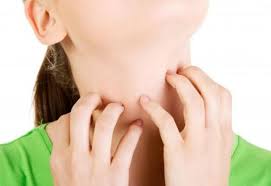Itching may be most
noticeable at night (nocturnal), during the day, or both. When there are
itching symptoms, there can be a leathery or scaly texture to the skin
depending on the cause.
Itching can be caused by toxins on the skin (contact dermatitis, such as from
poison ivy, poison oak, poison sumac, or grass oils), medications, liver
disease, kidney disease, insect bites, hives (urticarial), rare forms of skin
cancer (mycosis fungoides and T-cell lymphomas), infections (including
chickenpox and fungal infections such as athlete's foot and jock itch),
irritation from clothing, eczema, dermatitis herpetiformis, hemorrhoids, and
many other conditions, or it can remain unexplained. Infectious causes of
itching include sexually transmitted diseases (STDs), parasites (such as
scabies, fleas, bedbugs, pinworms, and lice), and viral rashes.
There are many causes of diffuse and localized itching. Itching symptoms can be
associated with
rash,
dry skin,
cracked skin,
flaky skin,
flaky scalp,
skin redness,
bumps on the skin,
blisters, or
spots on the skin.



 Contact Us
Contact Us






 Hospitals
Hospitals
 Doctors
Doctors
 Diagnostic
Diagnostic
 Pharmacy
Pharmacy
 Health Tips
Health Tips
 Blog
Blog

























Comments